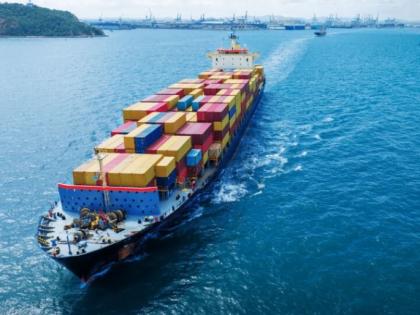Types of marine insurance: Which one do you need?
By Impact Desk | Updated: April 16, 2025 19:10 IST2025-04-16T19:09:27+5:302025-04-16T19:10:10+5:30
Shipping goods, whether domestically or internationally, comes with certain risks. Shipments can be damaged in transit, lost due to ...

Types of marine insurance: Which one do you need?
Shipping goods, whether domestically or internationally, comes with certain risks. Shipments can be damaged in transit, lost due to piracy or destroyed by natural disasters. Sometimes, even the ship and the terminals may be destroyed by natural calamities. These incidents can cause significant financial losses for the shipping business, shipper and buyer. To mitigate the risks in shipping, ship owners, consignors and consignees can obtain marine insurance. It ensures the policyholder gets adequate compensation for the damage or loss.
Different types of marine insurance are available and choosing the right one can be confusing. In this guide, we’ll break it down in simple terms so you can easily decide which one suits your needs.
What is marine insurance?
Marine insurance is a type of policy that covers ships, terminals, cargo, and freight against losses or damages while in transit. It provides financial protection for businesses, importers, exporters and logistics providers.
Whether you’re an occasional shipper, shipowner or a large-scale logistics provider, having the right type of marine insurance is crucial for safeguarding your finances and having peace of mind.
Why is marine insurance important?
Transporting goods via sea route involves multiple risks, such as:
- Ship Accidents: Collisions, fires or mechanical failures of the ship can damage cargo.
- Theft & Piracy: Goods can be stolen while in transit, leading to financial losses.
- Natural Disasters: Hurricanes, tsunamis, and storms can damage ships and cargo.
- Mishandling: Improper loading, unloading, or storage can cause damage to shipments.
- Legal Liabilities: If a vessel causes damage to another ship or the environment, compensation claims may arise.
Having single transit marine insurance ensures that businesses and individuals are financially protected against such unforeseen events.
Types of marine insurance
There are different types of marine insurance, each designed to cover specific risks and needs. Let’s explore them in detail:
Classification based on coverage area
Depending on the specific aspect insured, marine insurance is of the following types:
1. Hull insurance
It covers physical damage to the ship’s hull, including machinery and equipment.
Best for: Shipowners and cargo vessel operators.
Covers:
- Collision damage to the ship
- Loss due to fire or explosion
- Damage due to natural disasters such as storms and cyclones
- Mechanical breakdowns
2. Cargo insurance
It provides coverage for the goods being transported. It is one of the most common types of marine insurance, used by cargo owners to protect their shipments.
Best for: Importers, exporters and businesses transporting goods.
Covers:
- Theft or pilferage
- Accidental damage during transit
- Loss due to fire or natural disasters
- Spoilage or contamination (for perishable goods)
3. Freight insurance
It provides coverage to shipping companies for the loss of freight income if the cargo is lost, damaged or destroyed during transit. It helps the business recover their freight charges, which are often prepaid.
Best for: Sipping companies, freight forwarders and logistics providers.
Covers:
- Loss of freight charges due to cargo damage
- Compensation for prepaid freight costs
4. Liability insurance
This policy protects shipowners and transporters against third-party claims arising from accidents, injuries, or environmental damage caused by their vessels.
Best for: Shipowners, cargo handlers and transport operators.
Covers:
- Legal claims for damages caused by the vessel
- Injury claims from crew members
- Compensation for oil spills or environmental damage
Classification based on duration of coverage
Marine insurance policies are of the following types according to the length of time they provide coverage.
1. Single transit insurance
If you’re not a regular shipper and transport goods only occasionally, single transit insurance is the perfect option. This covers a specific shipment during a single journey.
Best for: Businesses or individuals transporting goods occasionally.
Covers: Loss or damage during a one-time shipment
2. Open marine insurance
For businesses that frequently transport goods, an open marine insurance policy covers multiple shipments over a set period, eliminating the need for separate policies each time.
Best for: Businesses with regular shipments.
Covers: Damage or loss across multiple shipments
3. Port risk insurance
This policy provides coverage for ships while they are stationed at a port for maintenance, repairs, or loading/unloading cargo.
Best for: Shipowners and port operators.
Covers:
- Damage while docked at a port
- Accidents during loading/unloading
- Fire, theft, or vandalism at the port
8. War risk insurance
War risk insurance covers damages to a vessel or cargo due to war-related events such as terrorist attacks, piracy, or political unrest.
Best for: Businesses shipping goods to high-risk zones.
Covers:
- Loss due to armed conflicts
- Damages from terrorist activities
- Cargo hijacking by pirates
How to choose the right marine insurance?
Choosing the right marine insurance depends on:
- Type of cargo – Perishable goods need cargo insurance with spoilage coverage.
- Frequency of shipments – Regular shippers should opt for open marine insurance.
- Shipping route risks – If shipping to high-risk zones, consider war risk insurance.
- Business type – Freight companies need freight insurance, while shipowners require hull insurance.
Conclusion
Choosing the right marine insurance policy ensures that your business stays protected from financial losses. Take the time to compare different options, check coverage details, and choose one that aligns with your business needs. Stay protected, ship with confidence and focus on growing your business without worrying about risks at sea!
Open in app